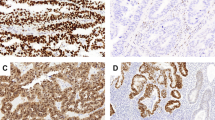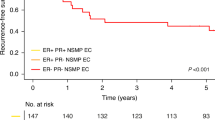Abstract
The important role of the p53 gene in tumour progression and cellular response to DNA damage has prompted investigation of the clinical significance of alterations to this gene. We examined both p53 overexpression and mutation of the gene in endometrial carcinoma in order to evaluate the prognostic significance of these changes. Of 122 endometrial carcinomas, 33 (27%) showed overexpression of p53 in the nucleus and 66 (54%) in the cytoplasm. Mutation in the p53 gene was found in 16 (13%) cases but showed no significant association with patient survival. Nuclear p53 overexpression was associated with poor survival (48% vs 80% alive in negative tumours 5 years post operatively, P < 0.001). In contrast, cytoplasmic p53 overexpression was associated with better survival (85% vs 55%, P < 0.001). When patients were separated into prognostic subgroups according to established clinical markers, these associations remained significant within most subgroups examined. In multivariate analysis adjusted for surgical stage, histological grade and type and vascular invasion, both nuclear p53 overexpression [hazard ratio 4.9 (95% CI 1.3-17.6). P = 0.016] and cytoplasmic overexpression [0.25 (0.06-0.98), P = 0.047] were independent prognostic factors. Immunohistochemical assessment of p53 overexpression in the nucleus and cytoplasm could provide useful prognostic information for the management of patients with endometrial cancer.
This is a preview of subscription content, access via your institution
Access options
Subscribe to this journal
Receive 24 print issues and online access
$259.00 per year
only $10.79 per issue
Buy this article
- Purchase on Springer Link
- Instant access to full article PDF
Prices may be subject to local taxes which are calculated during checkout
Similar content being viewed by others
Author information
Authors and Affiliations
Rights and permissions
About this article
Cite this article
Soong, R., Knowles, S., Williams, K. et al. Overexpression of p53 protein is an independent prognostic indicator in human endometrial carcinoma. Br J Cancer 74, 562–567 (1996). https://doi.org/10.1038/bjc.1996.401
Issue Date:
DOI: https://doi.org/10.1038/bjc.1996.401
This article is cited by
-
Loss of Cdh1 and Trp53 in the uterus induces chronic inflammation with modification of tumor microenvironment
Oncogene (2015)
-
p53 and BCL-2 as Prognostic Markers in Endometrial Carcinoma
Pathology & Oncology Research (2008)
-
P53/MDM2 overexpression in metastatic endometrial cancer: correlation with clinicopathological features and patient outcome
Clinical & Experimental Metastasis (2007)
-
Intratumoral heterogeneous expression of p53 correlates with p53 mutation, Ki-67, and cyclin A expression in endometrioid-type endometrial adenocarcinomas
Virchows Archiv (2005)
-
Immunohistochemical expression of cyclin E in endometrial adenocarcinoma (endometrioid type) and its clinicopathological significance
Journal of Cancer Research and Clinical Oncology (2003)



